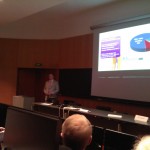Future trends of Mobile and Internet Communications are revealed at the Conference on Future Internet Communications 2013 in Coimbra, Portugal. The many different speeches and talks show that Cloud Computing could play a major role in future Mobile Communication networks.

The first keynote speech of the Conference was held by Alexander Sayenko, researcher at Nokia Siemens Networks, where he is responsible for standardization activities of the 3GPP-specification. In his keynote speech he presented the new HetNet multicarrier solution for the enhancement of current mobile communication traffic. While mobile communication traffic is expected to grow exponentially for the next decade, very diverse requirements concerning reliability and mobility of IT services offer a major challenge to the telecommunication industry. In order to be able to handle the growing mobile traffic, widening the available radio spectrum breadth and enhancing spectral efficiency as well as offloading of communication data to clusters of mobile base stations should enhance capacity of current mobile networks. HetNet offers a solution to enhance the radio spectrum and use the radio spectrum more efficiently by meshing up multiple heterogenous access networks. The future trend in mobile communication is going towards managing heterogeneous network infrastructures since the new standards like LTE and HSPA+ are still not used broadly and will not likely replace older technologies as fast as expected by the mobile end users. While the number of mobile devices and applications grows rapidly, changes in the infrastructure of mobile communication providers are performed much more slowly. New standards in mobile communications are a necessity in order to avoid a situation where the network infrastructure becomes a bottleneck to the mobile communication market.
Bottleneck: low efficiency of current access networks
The message is clear: mobile networks should be used more efficiently. An efficiency gain could be provided by the use of Cloud Computing for mobile networks. Andreas Kassler, researcher at Karlstads University in Sweden, showed CloudMAC – a new approach on how to allow location-independent routing of mobile devices in Wireless networks without introducing additional routing protocol overhead like e. g. in the Mobile IP protocol. The solution is to source the routing logic from Wireless Termination Endpoints into a virtualized infrastructure like e. g. an OpenStack cloud. Such an approach shows that Cloud Computing could become very important for the development of more efficient mobile networks. Therefore projects like e. g. the Mobile Cloud Network at ICCLab can make mobile communication ready for the challenges of the next decade.
ICCLab: enhance Quality of Cloud Services
The ICCLab had also a chance to present the benefits of Cloud Services for future Internet communications. Konstantin Benz, researcher at ICCLab, presented different technologies for OpenStack which should enable High Availability. He also showed how the Chaos Monkey tool could be transformed in a test framework which can add HA readiness of OpenStack architectures. The ongoing research about Cloud Automation, Cloud Dependability, Cloud Interoperability, Cloud Monitoring and Cloud Performance at ICCLab improves the overall quality of Cloud Computing as a service. Therefore Cloud Computing offered by ICCLab is able